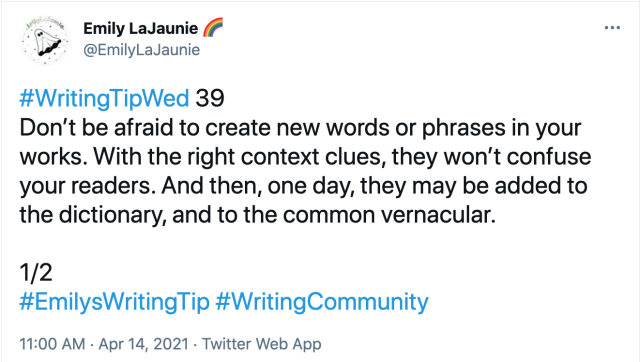#english grammar
Chris explains the difference between English verbs ‘hear’ and 'listen to’; 'see’, 'look at’ and 'watch’.
does anyone else find their grammar getting worse in their native language as they learn more languages?
for example, i’ve always known the difference between their/there/they’re, and i’ve never really understood how people could mix them up, but now i find myself making typos all the time mixing those up even though i know the difference??
it’s so embarrassing





June’s WritingTipWed! Every Wednesday I post a writing tip on my Twitter! If you want to see these weekly, follow me @/EmilyLaJaunie.
~✦~✦~✦~✦~✦~✦~✦~✦~✦~✦~
#WritingTipWed 46 - When writing a queer character, don’t make the character’s only defining trait about being queer.
Ex, just how you wouldn’t write a character whose trait is being straight, don’t make one whose trait is being gay.
#WritingTipWed 47 - When writing something set in a previous time period, look up what words/phrases were commonly used/didn’t exist yet. And for meanings of words, as they can change over time.
A “gay man”, for instance, used to be a womanizer.
Excerpt from en.wikipedia.org/wiki/Gay:
“The word may have started to acquire associations of immorality as early as the 14th century, but had certainly acquired them by the 17th. By the late 17th century, it had acquired the specific meaning of "addicted to pleasures and dissipation”, an extension of its primary meaning of “carefree” implying “uninhibited by moral constraints”. A gay woman was a prostitute, a gay man a womanizer, and a gay house a brothel. An example is a letter read to a London court in 1885 during the prosecution of brothel madam and procuress Mary Jeffries that had been written by a girl while slaved to a French brothel:
“I write to tell you it is a gay house…Some captains came in the other night, and the mistress wanted us to sleep with them.”“
#WritingTipWed 48 - Accept that when you’re writing a queer story, even if you consulted with hundreds of queer sensitivity readers/beta readers, that your story will not satisfy everyone. You can’t please everyone, so still, be proud!
#WritingTipWed 49 - The APA now endorses the use of “they” as a singular third-person pronoun and it is part of the APA style!
So instead of writing “he or she” write “they” and instead of “his or her” write “their.”
apastyle.apa.org/blog/singular-they
#WritingTipWed 50 - On this last day of Pride Month, remember to love. Love yourself, love others, love your writing. Write about what you love, who you love. The love of friends, families, partners, that’s what makes a story powerful.




May’s WritingTipWed! Every Wednesday I post a writing tip on my Twitter! If you want to see these weekly, follow me @/EmilyLaJaunie.
~✦~✦~✦~✦~✦~✦~✦~✦~✦~✦~
#WritingTipWed 42 - “a” vs “an”
“a” is used before words that start with a consonant sound and “an” before words with a vowel sound.
Ex: This could take anywhere between an hour and a week.
writersdigest.com/write-better-fiction/a-before-consonants-and-an-before-vowels-is-not-the-rule
#WritingTipWed 43 - Re-writing over and over again can do more bad than good. Once you’re satisfied (which means there are still tweaks you could make), let someone else read it or let it stew for a few days. You’re looking for fresh eyes.
#WritingTipWed 44 - Remember that a critique can be based on a personal preference and not objectively. No one writer would write the same scene the same way. These should still be considered but remember your preferences are just as valid.
#WritingTipWed 45 - Use “There is”/“There are” at the beginning of your sentences as little as possible for better sentence variety. Because if every other sentence began as such, the work would be unnecessarily repetitive.






April’s WritingTipWed! Every Wednesday I post a writing tip on my Twitter! If you want to see these weekly, follow me @/EmilyLaJaunie.
~✦~✦~✦~✦~✦~✦~✦~✦~✦~✦~
#WritingTipWed 38 - A sentence doesn’t always have to be grammatically correct, especially with commas. If the sentence your grammar checker flagged for not having/having a comma flows better the way you wrote it, then keep it.
#WritingTipWed 39 - Don’t be afraid to create new words or phrases in your works. With the right context clues, they won’t confuse your readers. And then, one day, they may be added to the dictionary, and to the common vernacular.
Like Shakespeare who invented over 1000 words in the English language, like “bedazzled” and “addiction”, and many of them are used in everyday conversation to this day.
#WritingTipWed 40 - Cliches are not inherently bad. There are bad ones sure but using some in your writing doesn’t automatically make you a bad writer. You shouldn’t avoid them completely and should incorporate some into your writing.
Using selective cliches adds familiarity to your writing. Readers can get excited because they somewhat expect what’s going to happen. And then, if you subvert the cliche, it’ll create surprise/intrigue in your readers and it’s a great way to make a statement/critique.
#WritingTipWed 41 - If you cringe at what you’ve written before, whether it was years ago or yesterday, that’s good! You’ve grown as a writer and are more certain of how you want to write, even if you don’t know how to fix it at the moment.
Apparently a lot of people get dialogue punctuation wrong despite having an otherwise solid grasp of grammar, possibly because they’re used to writing essays rather than prose. I don’t wanna be the asshole who complains about writing errors and then doesn’t offer to help, so here are the basics summarized as simply as I could manage on my phone (“dialogue tag” just refers to phrases like “he said,” “she whispered,” “they asked”):
- “For most dialogue, use a comma after the sentence and don’t capitalize the next word after the quotation mark,” she said.
- “But what if you’re using a question mark rather than a period?” they asked.
- “When using a dialogue tag, you never capitalize the word after the quotation mark unless it’s a proper noun!” she snapped.
- “When breaking up a single sentence with a dialogue tag,” she said, “use commas.”
- “This is a single sentence,” she said. “Now, this is a second stand-alone sentence, so there’s no comma after ‘she said.’”
- “There’s no dialogue tag after this sentence, so end it with a period rather than a comma.” She frowned, suddenly concerned that the entire post was as unasked for as it was sanctimonious.
And!
- “If you’re breaking dialogue up with an action tag”—she waves her hands back and forth—”the dashes go outside the quotation marks.”
Reblog to save a writer’s life.
okay guys poll time: if a blanket is dirty would you say “this blanket needs washed” or “this blanket needs to be washed”
needs to be washed, because it’s the correct construction. The other one is a regionalism - I’ve only ever seen/heard it in the American Midwest.
It’s a regional thing in Scotland - my partner is Scottish and he would say ‘needs washed’.
I’m Scottish (from the Borders) and I wouldn’t say either of those. For me it would be: “it needs a wash” or “it needs washing”.
There’s a difference in meaning between the two phrases, but I’m struggling to put it into words.
А вы помните, как использовать SOMEиANY? Наверняка помните! Если нет, давайте мы вам напомним:
1. Значение: some можно определить как “несколько”, “немного” (когда говорящему все равно, сколько именно). Any - “какой-нибудь”, “никакой”.
2.SOME обычно используется в утвердительных предложениях:
- This job is going to take some time: Эта работа займет немного времени
- You have some butter on your face: у тебя немного масла на лице
- Let’s stop by that shop, I want to pick up some apples: Давай зайдем в тот магазин, я хочу купить несколько яблок.
3.ANY, соответственно - для всего остального: негативных и вопросительных предложений:
- I looked in the cupboard but couldn’t find any biscuits: Я посмотрела в шкафчике, но не нашла никаких печенек
- She doesn’t need any help: Ей не нужна никакая помощь
- Did you see any fish? Ты видела каких-нибудь рыб?
Вроде все просто! Но, секунду:
Some можно использовать ввопросительных предложениях, если речь идет о просьбе или предложении: Would you like some more tea?
Аany вполне можно встретить в утвердительныхпредложениях, если оно используется в смысле “все равно, какой”: Which book shall I read? - You can pick any book you want.

На самом деле, все очень просто! Если хотите немного потренироваться, попробуйте перевести эти предложения:
- У нас нет хлеба, надо пойти в магазин.
- У меня есть немного фруктов. Хочешь?
- Нетфликс - очень удобное приложение, потому что я могу найти любой фильм с помощью функции “поиск”.
Одно из моих любимых выражений! Fair само по себе означает “справедливо”, а вражение fair enough можно использовать в двух случаях:
1. когда вы понимаете, почему у человека та или иная реакция или мнение.
- “I’m just annoyed with him because he’s behaved so badly.” “Fair enough.” “Я просто раздражен, потому что он плохо себя вел” - “Справедливо”
2. когда вы хотите сказать, что какое-то действие достаточно разумно, но есть что-то большее
- Fair enough, you didn’t have a perfectly happy childhood: but your childhood is over now. Хорошо, твое детство не было счастливым; Но детство закончилось.
Это идеальное выражение! Очень подходит для выражения солидарности и понимания. Что-то из этого:

